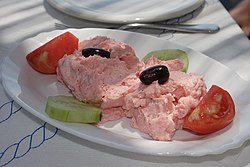 A plate of taramasalata garnished with cucumber, olives and tomato A plate of taramasalata garnished with cucumber, olives and tomato | |
| Type | Spread |
|---|---|
| Course | Meze |
| Place of origin | Greece |
| Main ingredients | Tarama (salted and cured roe of cod or carp), bread crumbs or mashed potatoes, lemon juice or vinegar, olive oil |
Taramasalata or taramosalata (Greek: ταραμοσαλάτα; from taramás 'fish roe' < Turkish: tarama + Greek: saláta 'salad' < Italian: insalata) is a meze made from tarama, the salted and cured roe (colloquially referred to as caviar) of the cod, carp, or grey mullet (bottarga) mixed with olive oil, lemon juice, and a starchy base of bread or potatoes, or sometimes almonds. Variants may include garlic, spring onions, or peppers, or vinegar instead of lemon juice. While not traditionally Greek, smoked rather than cured cod's roe is more widely available in some places, and often used. Bottarga is usually much more expensive than cod's roe.
Traditionally the dish is made with a pestle and mortar, giving a slightly grainy texture, but commercial taramasalata is commonly blended to a very smooth paste.
Taramasalata is usually served as a meze, often with ouzo, as a spread on bread. The colour can vary from creamy beige to pink, depending on the type of roe and colourings used. Most taramasalata sold commercially is dyed pink, but high-quality taramasalata is always beige in colour.
In Greece, taramasalata is often served on Clean Monday (Καθαρά Δευτέρα, Kathará Deftéra), the first day of Great Lent, with onions and lemon.
Etymology
Borrowed from Greek word ταραμάς (roe), itself a borrowing from Turkish tarama. Normally, tarama is the salted roe itself, but sometimes the prepared dish is also called tarama.
The spelling taramosalata reflects the Greek, but in English the a spelling is common.
Salată de icre


A similar dip or spread, salată de icre ('roe salad' in Romanian) is also common in Romania and Bulgaria (known as хайвер, or haiver), and Israel (where it is known as ikra). It is made with pike or carp roe, but generally with sunflower or vegetable oil instead of olive oil, sometimes with a thickener like white bread. It is mass-produced and is widely available in grocery shops and supermarkets, as well as being made at home, in which case chopped onions are commonly added. It has a consistency and taste similar to mayonnaise, with the roe taking the place of the egg as protein. The traditional production method of salată de icre is standardized under the Romanian departmental standard N.I.D. 927-70 N 23 and registered as an EU Traditional Speciality Guaranteed under the name "Salată tradițională cu icre de crap". The roe of this product is for over 50% carp based.
A dip, fasole bătută or fasole făcăluită (mashed beans), prepared with mashed beans, sunflower oil, garlic and chopped onions, is sometimes called icre de fasole (beans roe).
See also
References
- Ayverdi, İlhan (2005). "tarama". Misalli Büyük Türkçe Sözlük . Vol. 3 (O–Z). Kubbealtı. p. 3069. ISBN 975-6444-24-X.
- "taramasalata". The American Heritage Dictionary of the English Language. Houghton Mifflin Company.
- ^ Kochilas, Diane (February 28, 2012). "Tarama, Greek cod roe, explained". DianeKochilas.com. Retrieved January 27, 2017.
- ^ Basan, Ghillie; Basan, Jonathan (15 April 1997). Classic Turkish Cooking. p. 68. ISBN 0312156170.
- ^ Felicity Cloake (13 May 2015). "How to make the perfect taramasalata". The Guardian. Retrieved 4 June 2017.
- ^ Susanna Hoffman, Victoria Wise, The Olive and the Caper: Adventures in Greek Cooking, 2004, ISBN 1563058480, p. 43
- Georgios Babiniotis, ed., Λεξικό της Νέας Ελληνικής Γλώσσας
- Taramosalata is the spelling in the Oxford English Dictionary, with -a- given as an alternate form. -a- is the only spelling given in The Macquarie Dictionary (1995) for Australian English; in Chambers Dictionary (1994), Collins English Dictionary 6th Edition (2003), Concise Oxford Dictionary 9th Edition (1995), and The Times English Dictionary (2000), all of which represent British English but indicate alternate US spellings and indicate nothing here. -o- is also given, but second so that -a- is preferred, by Longman Dictionary of the English Language (1988) (British publisher). The word was not given at all a few decades ago such as in Webster's New Collegiate Dictionary (1977) or their three-volume 3rd International (1971) and is now given with -a- in The American Heritage Dictionary, see note above.
- "Publication of an application for registration of a name pursuant to Article 50(2)(b) of Regulation (EU) No 1151/2012 of the European Parliament and of the Council on quality schemes for agricultural products and foodstuffs (2021/C 222/09)". European Union.
- Perianu, Catherina (2008). "Précarité alimentaire, austérité" [Food insecurity and austerity]. Manger pendant la dernière décennie communiste en Roumanie / Eating in the last decade of Communism in Romania (in French) (6). doi:10.4000/aof.4513. Retrieved 2012-02-24.
| Seafood | |
|---|---|
| Fish | |
| Shellfish | |
| Other seafood | |
| Processed seafood | |
| Seafood dishes | |
| Health hazards | |
| Advisory services | |
| Animal welfare | |
| Related topics | |
| Cypriot cuisine | |||||||||||||
|---|---|---|---|---|---|---|---|---|---|---|---|---|---|
| Breads | |||||||||||||
| Cheeses | |||||||||||||
| Dried meats | |||||||||||||
| Dishes |
| ||||||||||||
| Desserts | |||||||||||||
| Drinks | |||||||||||||
| Cuisine of Romania | |
|---|---|
| Appetizers & salads | |
| Beverages | |
| Breads | |
| Cheeses | |
| Condiments & sauces | |
| Delicatessen | |
| Desserts | |
| Dishes | |
| Grilled meats | |
| Soups | |
